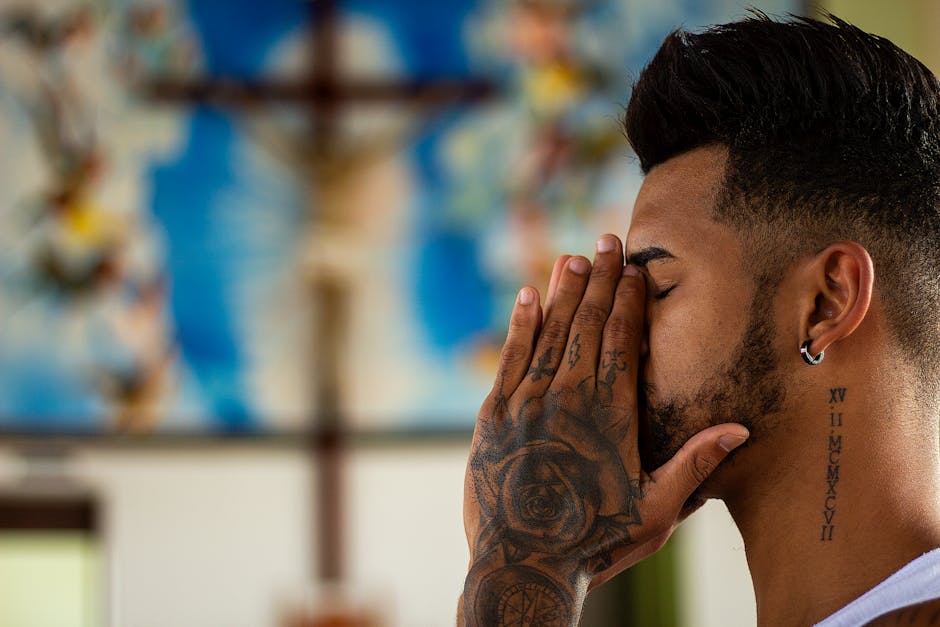Exploring the Power of Forgiveness in Religion
Forgiveness is a concept deeply ingrained in various religions around the world. It is a powerful force that can heal wounds, mend broken relationships, and bring peace to individuals and communities. But what is the true significance of forgiveness in the context of religion? How does it influence the beliefs, practices, and interactions of believers? In this article, we will delve into the multifaceted nature of forgiveness within different religious traditions, exploring its transformative power and relevance in today’s world.
The Foundations of Forgiveness

By Ric Rodrigues via Pexels
Forgiveness is often described as the act of pardoning someone for a perceived offense or wrongdoing. In the realm of religion, forgiveness goes beyond a mere transactional exchange; it is a fundamental principle that underpins the teachings and values of many faiths. For example, in Christianity, forgiveness is central to the teachings of Jesus Christ, who emphasized the importance of forgiving others as a way to receive God’s forgiveness. The Lord’s Prayer, a key prayer in Christianity, includes the line “Forgive us our trespasses, as we forgive those who trespass against us,” highlighting the reciprocal nature of forgiveness.
Similarly, in Islam, forgiveness is considered a virtue that is highly encouraged. The Quran emphasizes the importance of pardoning others, even in the face of great injustice. The Prophet Muhammad is known for his compassionate and forgiving nature, setting an example for Muslims to follow. In Hinduism, forgiveness is seen as a means to purify the soul and attain spiritual growth. The concept of karma, the law of cause and effect, is closely linked to forgiveness, as it underscores the interconnectedness of actions and their consequences.
These are just a few examples of how forgiveness is deeply rooted in religious teachings and traditions. By understanding the foundational principles of forgiveness within different faiths, we can gain insight into its profound impact on individuals and societies.
The Transformative Power of Forgiveness
Forgiveness has the power to transform individuals, relationships, and communities in profound ways. When we forgive, we let go of resentment, anger, and the desire for revenge, allowing healing and reconciliation to take place. In religious contexts, forgiveness is often viewed as a path to spiritual growth and enlightenment.
One of the key aspects of forgiveness is its ability to break the cycle of violence and retaliation. By choosing to forgive instead of seeking revenge, individuals can create a ripple effect of positivity and reconciliation. This is exemplified in the story of Archbishop Desmond Tutu, who played a pivotal role in the Truth and Reconciliation Commission in post-apartheid South Africa. Through the power of forgiveness, Tutu helped heal the wounds of a divided nation and usher in a new era of peace and reconciliation.
Forgiveness also has profound psychological benefits. Research has shown that holding onto grudges and resentment can have detrimental effects on mental and physical health, leading to stress, anxiety, and even chronic illness. By practicing forgiveness, individuals can experience greater emotional well-being, improved relationships, and a sense of inner peace.
Moreover, forgiveness can foster empathy, compassion, and understanding towards others. When we forgive, we acknowledge our shared humanity and recognize the capacity for growth and change in ourselves and others. This shift in perspective can lead to greater harmony and cooperation within communities, transcending barriers of anger, resentment, and division.
Forgiveness in Practice: Case Studies and Examples
There are numerous real-life examples of forgiveness in action, showcasing its transformative power in diverse contexts. One remarkable story is that of Eva Kor, a Holocaust survivor who forgave her captors, the Nazis, as a way to heal from the trauma of her experiences. Eva’s act of forgiveness not only liberated her from the burden of hatred but also inspired countless others to seek reconciliation and healing.
In the realm of interpersonal relationships, forgiveness plays a crucial role in resolving conflicts and restoring trust. Couples who practice forgiveness are more likely to have healthy, long-lasting relationships, characterized by mutual respect and understanding. Similarly, forgiveness is essential in the process of reconciliation between individuals and communities that have been torn apart by conflict or violence.
One notable example is the Amish community’s response to the tragic shooting at the West Nickel Mines School in 2006. Despite the senseless act of violence that claimed the lives of several innocent children, the Amish community chose to forgive the perpetrator and his family. Their act of forgiveness stunned the world and demonstrated the power of grace and compassion in the face of unspeakable tragedy.
The Challenges of Forgiveness
While forgiveness is a powerful and transformative force, it is not always easy to practice. The process of forgiving someone who has caused harm or pain can be incredibly challenging, requiring humility, empathy, and a willingness to let go of resentment. In cases of severe trauma or abuse, forgiveness may seem impossible or even undeserved.
Moreover, the concept of forgiveness can be misconstrued as condoning or excusing harmful behavior. It is important to distinguish between forgiveness, which is about releasing negative emotions and moving forward, and condoning, which is about overlooking or minimizing the harm caused. Forgiveness does not mean forgetting or minimizing the impact of the offense but rather choosing to let go of the emotional burden it carries.
Another challenge of forgiveness is the fear of vulnerability and further harm. When we forgive someone, we open ourselves up to the possibility of being hurt again. This fear can prevent individuals from extending forgiveness, leading to a cycle of resentment and bitterness. However, it is important to remember that forgiveness is a choice that empowers the forgiver, allowing them to reclaim their agency and emotional well-being.
The Role of Forgiveness in Religious Practices
Many religious traditions incorporate forgiveness into their practices and rituals as a way to cultivate compassion, humility, and spiritual growth. For example, in Christianity, the sacrament of confession and absolution allows believers to seek forgiveness for their sins and receive God’s mercy and grace. Similarly, in Islam, the practice of seeking forgiveness from Allah through repentance and prayer is a central tenet of the faith.
In Buddhism, forgiveness is seen as a way to release attachment and cultivate inner peace. The practice of loving-kindness meditation, which involves extending compassion and forgiveness to oneself and others, is a powerful tool for developing empathy and compassion. In Judaism, the High Holy Days of Rosh Hashanah and Yom Kippur are dedicated to seeking forgiveness from God and others, reflecting on one’s actions, and committing to personal growth and transformation.
These religious practices not only provide a framework for seeking forgiveness but also emphasize the importance of extending forgiveness to others. By incorporating forgiveness into their spiritual lives, believers can experience a deeper sense of connection, peace, and harmony with themselves and the world around them.
Expert Opinions on the Power of Forgiveness in Religion
Experts in psychology, theology, and religious studies have long recognized the profound impact of forgiveness on individuals and communities. Dr. Robert Enright, a leading researcher in the field of forgiveness studies, has conducted extensive research on the benefits of forgiveness for mental health and well-being. According to Dr. Enright, forgiveness is a process that can lead to increased empathy, resilience, and emotional healing.
Dr. Everett Worthington, a psychologist and author of “Forgiving and Reconciling,” emphasizes the importance of forgiveness in repairing damaged relationships and promoting reconciliation. Dr. Worthington’s research has shown that forgiveness can lead to greater marital satisfaction, improved mental health, and reduced levels of stress and anxiety.
Religious leaders and scholars have also highlighted the significance of forgiveness in the context of faith and spirituality. Pope Francis, the leader of the Catholic Church, has spoken extensively about the transformative power of forgiveness and the need for reconciliation in a divided world. His message of mercy and compassion has resonated with believers and non-believers alike, inspiring acts of forgiveness and reconciliation across religious and cultural boundaries.
Conclusion: The Enduring Legacy of Forgiveness
As we have explored in this article, forgiveness is a profound and transformative force that has the power to heal wounds, mend broken relationships, and bring peace to individuals and communities. In the realm of religion, forgiveness is not just a moral virtue but a fundamental principle that underpins the teachings and values of many faiths.
By practicing forgiveness, individuals can experience greater emotional well-being, improved relationships, and a sense of inner peace. Forgiveness has the power to break the cycle of violence and retaliation, fostering empathy, compassion, and understanding towards others. It is a choice that empowers the forgiver, allowing them to reclaim their agency and emotional well-being.
As we navigate the complexities of human relationships and societal challenges, the timeless wisdom of forgiveness offers a beacon of hope and healing. By embracing forgiveness in our lives and communities, we can build a more compassionate, harmonious, and resilient world for future generations to inherit.




